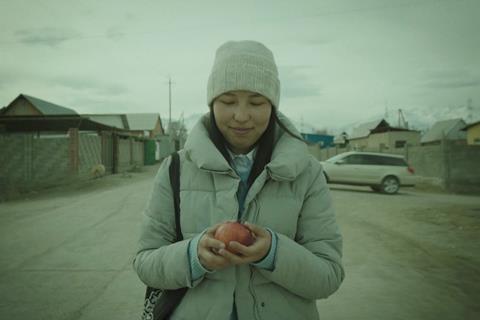Jiseok co-winner at Busan is a dour but powerful drama from Kyrgyzstan.

Dir: Mirlan Abdykalykov. Kyrgyzstan. 2023. 80mins
The standout title of this year’s Jiseok competition for established Asian directors at the Busan Festival, and one of the section’s two prizewinners, Bride Kidnapping is a dour but powerful drama by Kyrgyz filmmaker Mirlan Abdykalykov. Centering on the practice its title bluntly refers to, one still widespread in the Central Asian republic, it takes its time to tie the knot of a dramatic noose that is suddenly tightened in the final act with shocking effect.
Abdykalykov’s suffocating drama makes good use of its bleak settings
With its mix of working actors and non-professionals and its dirty ciné-verité shooting style, Abdykalykov’s third feature is ‘based on a true story’ and shot in the badlands of Bishkek, the capital of Kyrgyzstan. This is a world in which grim, blinkered people living grim, blinkered lives take down anyone who dares to show signs of happiness and independence. Particularly if they are female, and unmarried. It’s a film for hardened cineastes, in other words: but Bride Kidnapping is not just a misery fest. It is a thoughtful, fascinatingly constructed 80-minute drama which lulls its audience with a long and at times seemingly aimless build-up before we realise, with a jolt, where all this has been leading.
‘Bride kidnapping’ is something of a misnomer for a practice that still exists in many parts of the world, especially in the Caucasus and Central Asia. The young female victim, who is only very rarely consenting, is not a bride when she is kidnapped by the man who has singled her out, very often with the connivance of his family – and sometimes hers too. She becomes one after the event: when she is disgraced, unable to marry any man except her rapist.
At first, all this is very much in the background of the story, mentioned only in an offhand line delivered by minor character Meyerim, a single mother who, it turns out, has herself escaped a forced marriage. She’s now in a clandestine relationship with Egemen (Elchibek Shamenov, who also handled the film’s production design), a listless young man who is at the mercy of anyone who tells him what to do – his older sisters, who nag him to marry, or his brother-in-law, who enlists him as an accomplice on raids of rail yards and factories for old tyres, scrap metal and copper.
For a while, we’re not quite sure why we’re watching these two men making small change from this brutal work, or why we’re also following young nurse Umut (Akak Berdibekova). Her quiet smile and cheery demeanour is totally at odds with her surroundings – she and her mother live on a muddy dead-end street in the shadow of a belching smokestack, where everyone is behind with their bills. The two women can’t even afford to buy wood to heat the house.
Coming in the wake of a tragic 2021 bride kidnapping case that stirred debate in Kyrgyzstan and formed the subject of the recent documentary Who Is Next by Nurzhamal Karamoldoeva and Sultan Usuvaliev, Abdykalykov’s suffocating drama makes good use of its bleak settings – especially a lonely bus shelter, decorated in a sad municipal take on Central Asian rug motifs, which becomes a recurrent dramatic location. Not everything works; an episode involving a citizen journalist videoblogging about air pollution in this ravaged suburb is more than a little contrived. But Abdykalykov’s control of tone (for example through a colour palette that is dominated by murky greens and browns and dusty greys) is assured throughout.
Production company/international sales: Oy Art, altynaiko@gmail.com
Producers: Altynai Koichumanova, Aktam Aryn Kubat
Screenplay: Mirlan Abdykalykov, Marat Alykulov, Tynchtyk Abylkasymov
Production design: Elchibek Shamenov
Editing: Evgeniy Krokhmalenko
Cinematography: Zhantai Kydyraliev
Main cast: Akak Berdibekova, Elchibek Shamenov, Mairambek Erkegulov, Guljamal Mamytbekova, Ainur Akylbek






![The Brightest SunScreen[Courtesy HKIFF]](https://d1nslcd7m2225b.cloudfront.net/Pictures/274x183/3/5/0/1448350_thebrightestsunscreencourtesyhkiff_312678.jpg)















![The Brightest SunScreen[Courtesy HKIFF]](https://d1nslcd7m2225b.cloudfront.net/Pictures/100x67/3/5/0/1448350_thebrightestsunscreencourtesyhkiff_312678.jpg)

